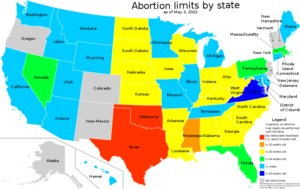The U.S. Supreme Court gave the go-ahead for Idaho to enforce a tough abortion ban, even in medical emergencies, on Friday. This decision has sparked a legal battle, focusing on the Emergency Medical Treatment and Labor Act (EMTALA). The Biden administration insists that hospitals receiving Medicare funds must offer emergency care, including abortion, regardless of state laws. This comes after the Supreme Court’s 2022 move to let states have more control over strict abortion laws.

Biden’s Argument and Legal Clashes
The Biden administration argues that EMTALA makes it necessary for healthcare providers to perform the procedure for emergency patients even if the state laws disagree. On the flip side, Idaho says the administration is using a law meant to stop hospitals from turning away patients and forcing a “federal abortion mandate” on states. Idaho already has a strict abortion law and has made it a crime, with up to five years in prison for anyone involved in an abortion.

The legal disagreement started when the Biden administration sued Idaho with claims that EMTALA forces healthcare providers to perform the procedure in emergencies even against state rules. The administration gave guidance on EMTALA two weeks after the 2022 Supreme Court decision and then sued Idaho a month later.
Broader Legal Landscape in Idaho
Different judges in different states made different decisions in this case. In Idaho, Judge B. Lynn Winmill supported the Biden administration, but in Texas, a judge backed the state. The Biden team says the federal EMTALA law is more important than state abortion laws in emergencies.
President Biden did not encourage the Supreme Court’s choice. He said his administration is determined to protect a woman’s right to emergency care under federal law. This legal fight makes people wonder who gets to decide on healthcare rules – the national government or individual states, especially when it comes to abortion.
This situation is just one part of a bigger legal picture in Idaho. There are more fights happening over the procedure. One case is trying to figure out when it is acceptable for someone to get a legal abortion. The Supreme Court will listen to arguments in April and make a decision by early summer.

Related Legal Developments in Idaho Regarding Abortion Rights
In a separate case, four women and multiple doctors have filed a lawsuit in Idaho seeking clarification on the conditions that make patients eligible for a legal abortion. Despite efforts by the Attorney General’s office to dismiss the case, the lawsuit has recently been given approval to proceed.
Furthermore, a federal judge had taken action in November by temporarily blocking Idaho’s “abortion trafficking” law. This law was passed by Idaho lawmakers the previous year and it aimed to restrict minors from obtaining the procedure in states where it is legal unless they have their parents’ consent. The enforcement of the law is on hold right now while a legal challenge to its implementation is occurring.











Comments 1